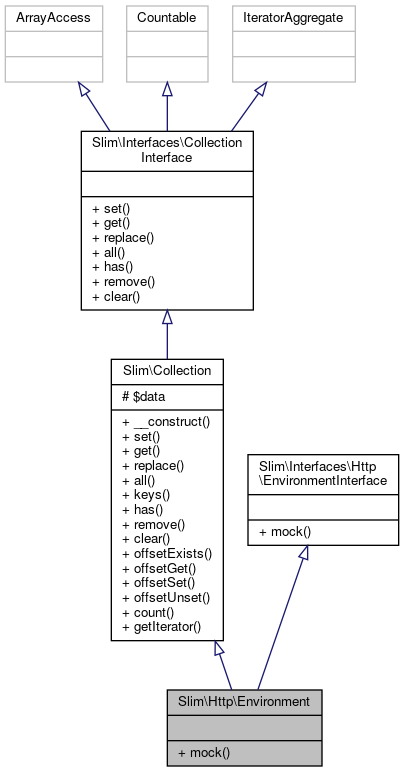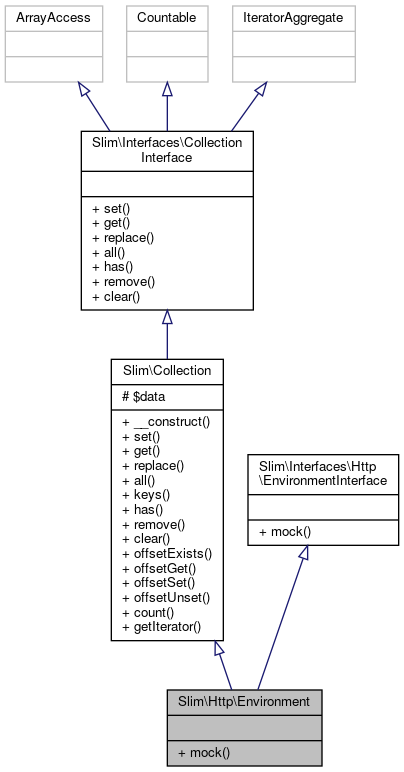Slim\Http\Environment Class Reference
 Inheritance diagram for Slim\Http\Environment:
Inheritance diagram for Slim\Http\Environment: Collaboration diagram for Slim\Http\Environment:
Collaboration diagram for Slim\Http\Environment:Static Public Member Functions | |
| static | mock (array $userData=[]) |
| Create mock environment. More... | |
| static | mock (array $settings=[]) |
Additional Inherited Members | |
 Public Member Functions inherited from Slim\Collection Public Member Functions inherited from Slim\Collection | |
| __construct (array $items=[]) | |
| Create new collection. More... | |
| set ($key, $value) | |
| Set collection item. More... | |
| get ($key, $default=null) | |
| Get collection item for key. More... | |
| replace (array $items) | |
| Add item to collection, replacing existing items with the same data key. More... | |
| all () | |
| Get all items in collection. More... | |
| keys () | |
| Get collection keys. More... | |
| has ($key) | |
| Does this collection have a given key? More... | |
| remove ($key) | |
| Remove item from collection. More... | |
| clear () | |
| Remove all items from collection. More... | |
| offsetExists ($key) | |
| Does this collection have a given key? More... | |
| offsetGet ($key) | |
| Get collection item for key. More... | |
| offsetSet ($key, $value) | |
| Set collection item. More... | |
| offsetUnset ($key) | |
| Remove item from collection. More... | |
| count () | |
| Get number of items in collection. More... | |
| getIterator () | |
| Get collection iterator. More... | |
| set ($key, $value) | |
| get ($key, $default=null) | |
| replace (array $items) | |
| all () | |
| has ($key) | |
| remove ($key) | |
| clear () | |
 Protected Attributes inherited from Slim\Collection Protected Attributes inherited from Slim\Collection | |
| $data = [] | |
Detailed Description
This class decouples the Slim application from the global PHP environment. This is particularly useful for unit testing, but it also lets us create custom sub-requests.
Definition at line 21 of file Environment.php.
Member Function Documentation
◆ mock()
|
static |
Create mock environment.
- Parameters
-
array $userData Array of custom environment keys and values
- Returns
- self
Implements Slim\Interfaces\Http\EnvironmentInterface.
Definition at line 30 of file Environment.php.
31 {
32 //Validates if default protocol is HTTPS to set default port 443
33 if ((isset($userData['HTTPS']) && $userData['HTTPS'] !== 'off') ||
34 ((isset($userData['REQUEST_SCHEME']) && $userData['REQUEST_SCHEME'] === 'https'))) {
35 $defscheme = 'https';
36 $defport = 443;
37 } else {
38 $defscheme = 'http';
39 $defport = 80;
40 }
41
42 $data = array_merge([
43 'SERVER_PROTOCOL' => 'HTTP/1.1',
44 'REQUEST_METHOD' => 'GET',
45 'REQUEST_SCHEME' => $defscheme,
46 'SCRIPT_NAME' => '',
47 'REQUEST_URI' => '',
48 'QUERY_STRING' => '',
49 'SERVER_NAME' => 'localhost',
50 'SERVER_PORT' => $defport,
51 'HTTP_HOST' => 'localhost',
52 'HTTP_ACCEPT' => 'text/html,application/xhtml+xml,application/xml;q=0.9,*/*;q=0.8',
53 'HTTP_ACCEPT_LANGUAGE' => 'en-US,en;q=0.8',
54 'HTTP_ACCEPT_CHARSET' => 'ISO-8859-1,utf-8;q=0.7,*;q=0.3',
55 'HTTP_USER_AGENT' => 'Slim Framework',
56 'REMOTE_ADDR' => '127.0.0.1',
57 'REQUEST_TIME' => time(),
58 'REQUEST_TIME_FLOAT' => microtime(true),
59 ], $userData);
60
62 }
References Slim\Collection\$data.
The documentation for this class was generated from the following file:
- libs/composer/vendor/slim/slim/Slim/Http/Environment.php


